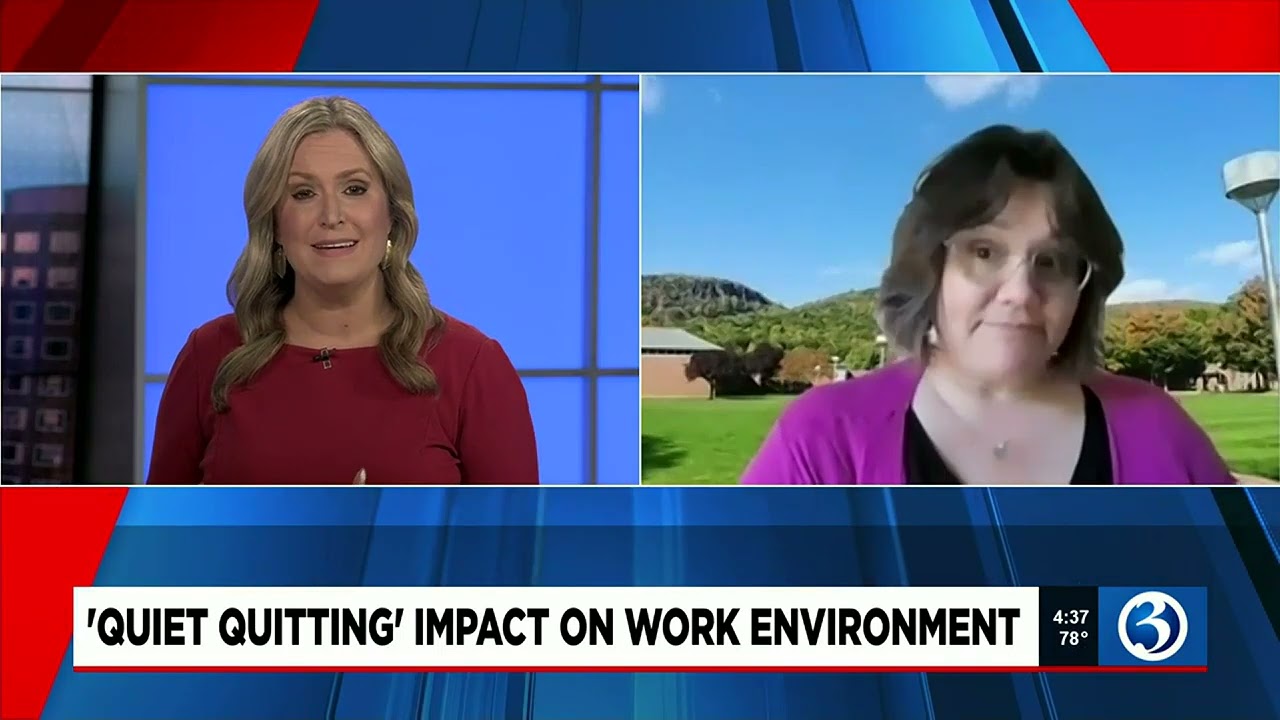
What’s all the fuss about ‘quiet quitting’?
QU experts weigh in on the trendy term
February 27, 2023

February 27, 2023

That’s the stark conclusion that can be drawn from a recent Gallup report indicating at least 50% of the American workforce is engaged in a wave of disengagement dubbed “quiet quitting.”
So what exactly does it mean, and how will it impact Quinnipiac graduates as they prepare to embark on 21st-century careers?
Experts on the Mount Carmel Campus and beyond weighed in on the polarizing workplace trend to help Quinnipiac Magazine put together this primer.
As many opinion pieces and news articles note, the term itself is misleading.
No, “quiet” does not refer to wordlessly slipping out the door or logging out of the group chat without so much as a peace sign emoji. Nor is the employee in question permanently abandoning their post. The “resignation generation” was a separate and semi-related pandemic-era phenomenon in which workers fled unfulfilling jobs en masse as they sought to improve their work-life balance under unprecedented levels of stress.
Carrie Bulger, PhD, a professor of organizational psychology at Quinnipiac who specializes on the topic, defines quiet quitting as “a renewed effort to really focus on what a job is and isn’t.”
“Pulling back” and “trying to withdraw” from one’s work duties isn’t a novel concept, Bulger said. But as she noted during a recent interview with WFSB-TV, slapping an alliterative label on it and tossing it around with abandon has caused a stir, pumping oxygen into a trend that’s here to stay.
It’s undoubtedly a buzzy term, tailor-made for a 10 o’clock TV news segment or front-page headline. In fact, a Google search produces hits from The Washington Post, The New York Times, The Wall Street Journal, The New Yorker and countless academic publications.
But is there really a crisis afoot? Upon closer examination, quiet quitting is less a harbinger of widespread revolt and more of a long overdue reckoning with outdated practices and stale office culture.
“For some folks, it’s probably a sign of unhappiness and a sign that they’re going to leave,” Bulger said. “But I think for others, quiet quitting isn’t that. Whether it’s from the pandemic and the measures that were taken in a work-from-home environment, or just kind of the realization that it’s all fleeting and work is not everything, people are quiet quitting because they’re trying to just do what they need to do. They want to do their job and do it well. But then they want to expend their energies and passions in other areas of their lives.”
Being forced to work at home amid the tumult of 2020 was an eye-opening experience, one that emboldened even the most dedicated employees to set healthy boundaries. And enforcing those boundaries can appear, through the lens of leadership, like slacking.
But it is quite possible to be invested in your work and redirect that passion once you clock out for the day, according to Bulger, whose academic research at Quinnipiac includes matters of employee wellness in the work and non-work realms. Pursuing “work-life enrichment” prioritizes self-care in one area and tends to breed success in the other, she said.
So you should take that hike. Try that recipe. Ignore your inbox while you’re at it. You’re not being neglectful; you’re being mindful. And mindful employees — those who can be fully present when acting as friends, parents, sons and daughters — maintain better focus and productivity, according to a 2021 Forbes study.
“I think what work-from-home really uncovered for folks is that they can have more joy in their daily life,” Bulger said. “I think what some of us realized is that we don't have to commute to the job we love. We can stay at home and do the job that we love. Or commute sometimes instead of every day. Before we were putting up with the hard stuff, the icky stuff. We had the home life that we liked, and we had the work life that we hopefully liked and then we put up with the hour-long commute or whatever it might be.
“Now we know we don't have to do that, and I think it's important because that's where you get healthy is in those moments of joy. Even when it's hard, when you're feeling like you're accomplishing something — whether it's in your work life or in your personal life — one domain feeds the other.”

There are, of course, divergent perspectives on quiet quitting. There’s what it means for workers and what it means for panicked employers in a precarious economy, and the collision of those viewpoints can have drastic consequences for the former.
Writing for The Wall Street Journal, columnist Callum Borchers outlined the perils of silently protesting your own job. In speaking with human resources professionals on the topic, he encountered a new term — “quiet firing” — in which reputations suffer as a result of perceived apathy, responsibilities are gradually diminished and a path toward actual termination materializes.
“Companies have always had subtle ways to nudge people out the door,” Borchers writes. “Tactics include sidelining them by cutting responsibilities or denying promotions and raises to make someone miserable enough to leave.”
The quiet quitting movement arrived at a time when the priorities of employers and their employees were particularly at odds. “Many companies are renewing their focus on what employees put out at the same time that a lot of workers are recalibrating what they put in,” Borchers writes.
The stakes of that struggle, according to economists, are quite high. NPR reported in October that annualized productivity was down 4.1% in the third quarter of 2022, reversing an upward trend that dated back decades. And with a downturn in productivity comes a larger threat to an economy that’s already imperiled by inflation, increasing the likelihood of layoffs and pay cuts.
At the very least, many companies could soon abandon work-from-home policies and make a full return to the office, falling back on the prevailing wisdom of manufacturing economies when “supervisors actually did walk the floor and watch what people were doing,” Bulger said.

Quiet quitting is widely seen as the antithesis of another buzzy phrase, “hustle culture,” the longstanding notion that putting in long hours, exceeding the parameters set by a job description and being generally agreeable represent your best chance to climb.
Turning down extra work shouldn’t be punishable, especially without a guarantee of any monetary benefit. But bosses aren’t always guided by reason. So it's fair to wonder if poor leadership, not unmotivated workers, is the real culprit for this economic slide.
While it’s true that managers were also without a blueprint at the start of the pandemic, the best ones have remained effective in a work-from-home or hybrid environment by leveraging the same interpersonal skills that helped them form meaningful connections with employees in the office, according to Brianna (Policano) Inoa ’13, who studied industrial and organizational psychology at Quinnipiac under Bulger.
Quiet quitting isn’t a threat when voices are regularly heard.
“[Leading a hybrid team] was a skill that a lot of managers were forced to learn very quickly and some are probably still working through,” said Inoa, a senior manager of talent development at MongoDB, a database platform company. “That changes the dynamic in the workplace because you're having to kind of relearn how to manage or relearn how to keep your team engaged, and you lose all those traditional tools. Happy hours, having a coffee in the morning to catch up and things like that.”
Venting over vanilla lattes might not be an option, but good managers still know how to sniff out distractions and help mitigate them.
“The manager has to actively build trust to get to that place,” said Inoa. “There’s a time for a manager to lean in and say, ‘I’ve noticed a change, what’s going on?’ The employee might say ‘this isn’t what I want anymore,’ and that’s OK. We don’t operate in a world where people really stay in companies for their entire career anymore.”
Today’s college students are rightly praised for their resiliency. But the same skills that made them so adaptable during the pandemic — they are digital natives who prefer Zoom lectures to the real thing — make them the target of generational disdain once they enter the workforce.
Can’t you just hear the grumbling: We wouldn’t have to worry about quiet quitting if these kids would get off TikTok and do their jobs.
Fittingly, the movement’s origins can be traced to TikTok, the massively popular video-sharing app, where the influencer Zaid Khan uttered a phrase that’s been quoted in countless news articles: “Your worth as a person is not defined by your labor."
In an essay for The New Yorker, Cal Newport, an associate professor of computer science at Georgetown, posits that Generation Z was better equipped than its forebears to leverage technology to push back against workplace norms.
“Gen Z entered the workforce with a mindset that was notably distinct from the millennials who preceded them,” Newport writes. “As the first group to fully come of age with smartphones and social media, Gen Z formed an understanding of the world in which the boundaries between the digital and real were blurred.”
So what role does quiet quitting play when you’re just trying to get quiet hired or quiet promoted? Asked what advice she would give to current students and recent graduates as they navigate a workforce that looks radically different than it did a few short years ago, Bulger offered a handful of suggestions:
Acquire as many skills as you can.
Learn how to market your skills.
Self-advocacy is key when it comes to both setting boundaries and demonstrating what you’re able to do. You’ll feel more comfortable asking for more support or asking for more responsibility.
Learn how to self-regulate. If you find yourself with a flexible job, you’ll need to know how to manage your time so you can be productive without burning yourself out.
Set your own goals apart from company goals or departmental goals.
Quiet quitting is here to stay. It’s not quite a revolution. But it is reshaping the modern workplace — and mostly for the better.
Quinnipiac Today is your source for what's happening throughout #BobcatNation. Sign up for our weekly email newsletter to be among the first to know about news, events and members of our Bobcat family who are making a positive difference in our world.
Sign Up Now